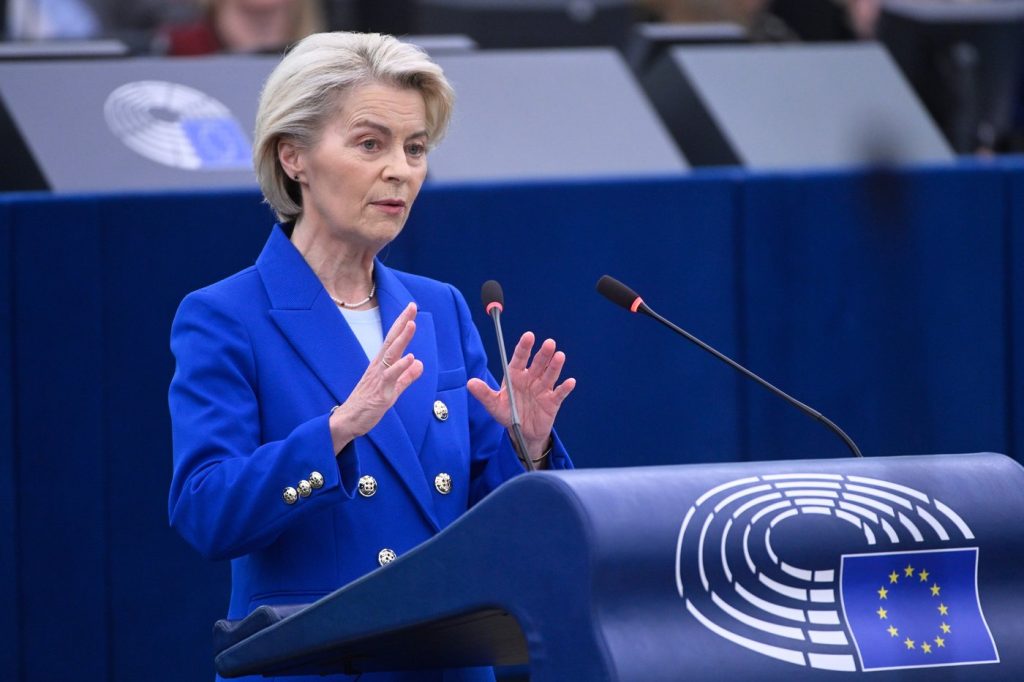BRUSSELS (AP) — Russia is conducting a "targeted gray zone campaign" against Europe, involving airspace violations, sabotage, and cyberattacks, European Commission President Ursula von der Leyen warned on Wednesday. She emphasized that these aggressive tactics from the Kremlin are likely to escalate unless adequately challenged by the European Union (EU).
In her address to EU lawmakers in Strasbourg, France, von der Leyen cited recent incidents over a span of two weeks, where fighter jets breached Estonia's airspace and drones flew over military bases and critical infrastructure in countries including Belgium, Denmark, Germany, Poland, and Romania. She insisted that Europe must respond decisively to these provocations, stating, "We must investigate every incident, and we must not shy away from attributing responsibility because every square centimeter of our territory must be protected and safe."
Von der Leyen stressed that hesitation in responding to these threats would lead to a further expansion of the gray zone tactics employed by Russia. In light of this ongoing threat, the EU's executive branch is preparing a comprehensive plan aimed at enhancing Europe’s defenses by the year 2030. EU officials predict that Russia could launch an attack against another European nation in the next three to five years, highlighting the urgency of the situation.
The proposed plan includes the establishment of a "drone wall" — a high-tech defense system integrated with tools capable of detecting, tracking, and neutralizing drones. This system will not only address the immediate challenges posed by drone incursions but also target their operating systems or pilots on the ground. Von der Leyen plans to present a "road map" for bolstering Europe’s defense capabilities to the heads of state and government from the 27-nation bloc within the next two weeks.
During her speech, von der Leyen criticized the unsustainable practice of scrambling advanced fighter jets to counter relatively low-cost drones, referencing an incident where several drones entered Polish airspace. She argued that, "This is absolutely not sustainable. We need an anti-drone system that is affordable and fit for purpose. For swift detection, swift interception, and when needed, swift neutralization," expressing the need for European nations to learn from Ukraine's experiences in dealing with drone threats.
Moreover, the European Commission aims to incentivize countries to invest more in defense by ensuring that such investments also support job creation and foster business growth within Europe. Von der Leyen insisted that at least 65% of any project financed with EU funds should be developed on the continent. She pointed out that most recent investments have gone to U.S. defense companies, which leads to job losses in Europe, stating, "Most investment goes outside Europe. In other words, these are jobs outside Europe. This is absolutely not sustainable." She emphasized that European funding should yield a return on investment in terms of local job creation.
At a recent summit in Copenhagen, the sentiments of several EU leaders regarding the threats from Russia appeared to harden, following an increase in the number of drone incidents, acts of sabotage, and cyberattacks. Notably, Denmark has refrained from directly attributing the drone flights over its territory to Russia. French President Emmanuel Macron has also called for a more aggressive European stance towards Russia, advocating for the downing of drones that violate European airspace and suggesting that Europe take measures such as boarding illicit oil transport ships to diminish Russia's war revenue.











